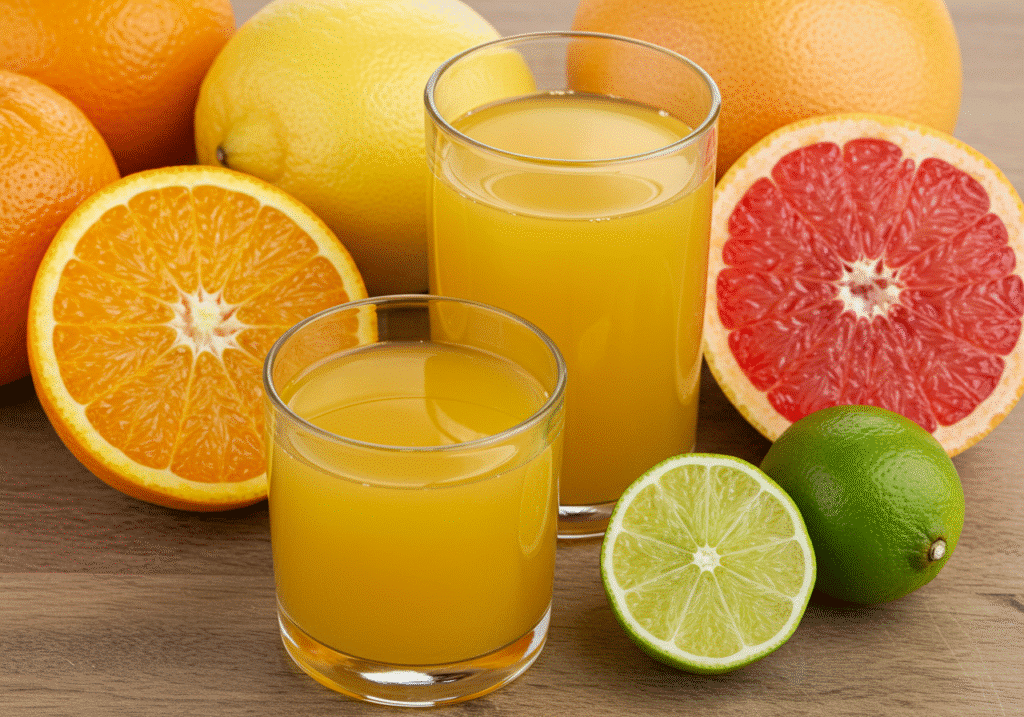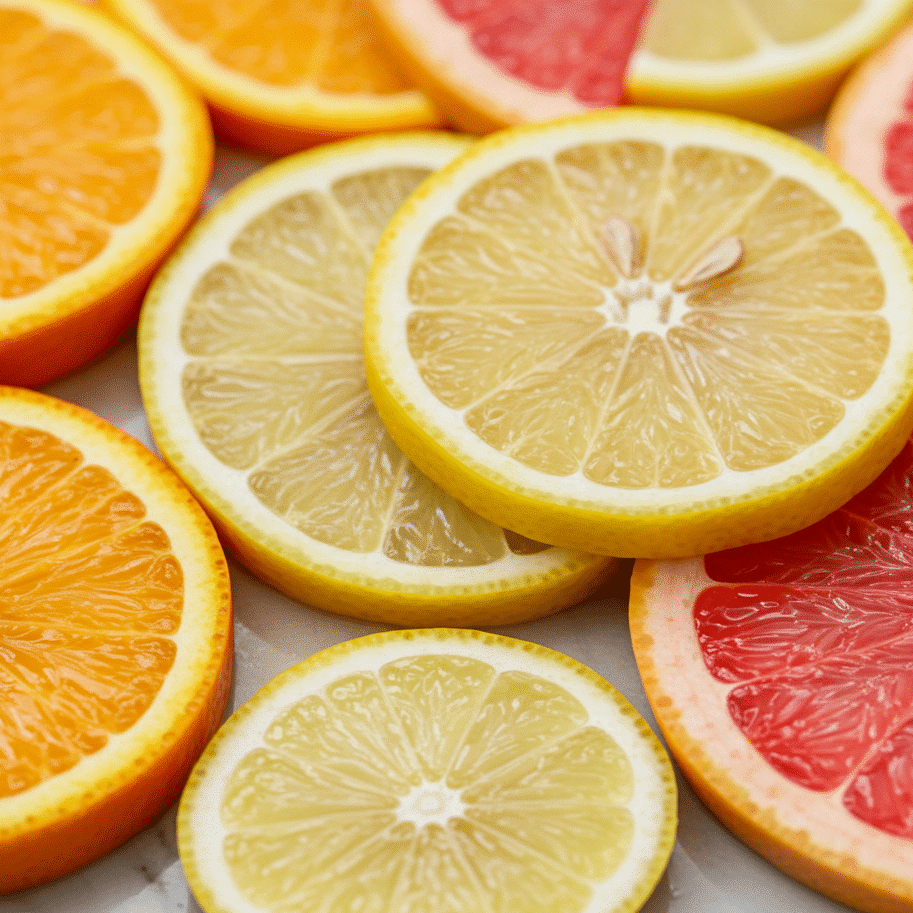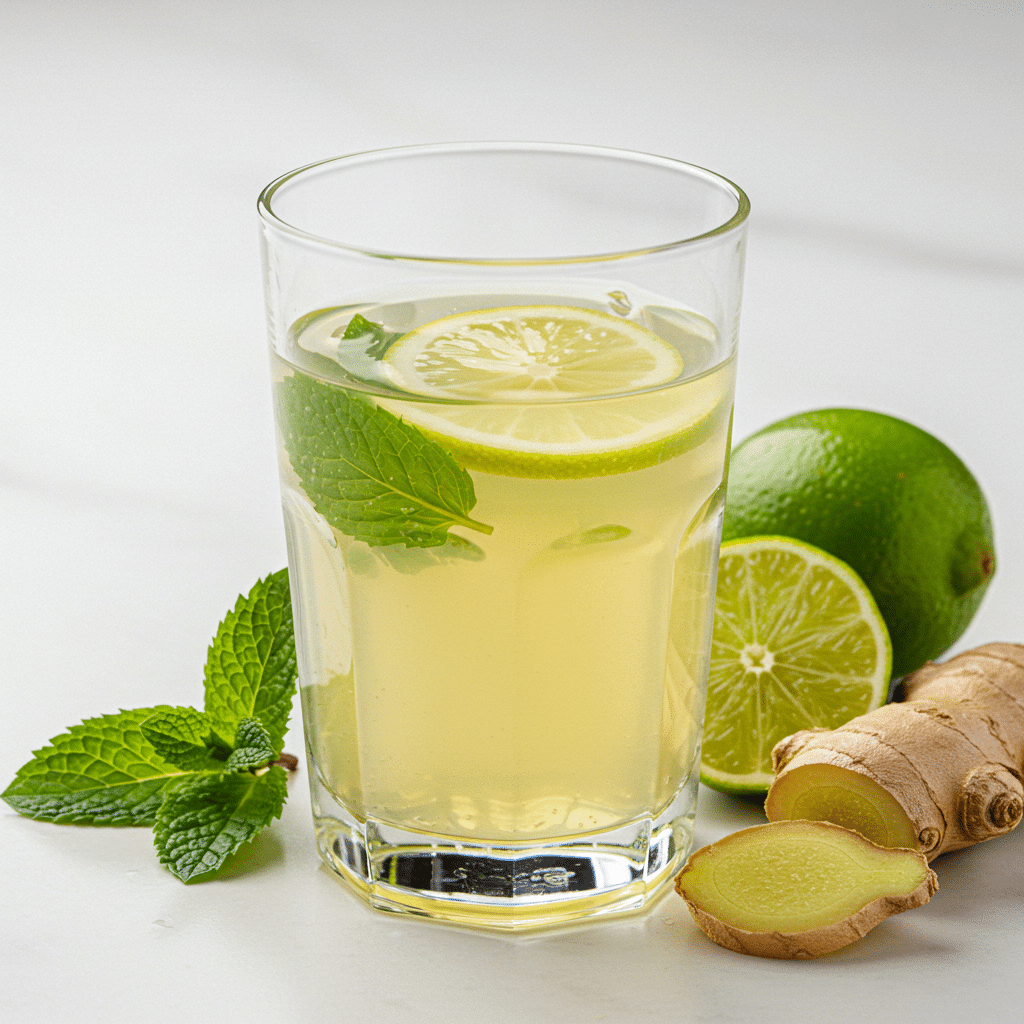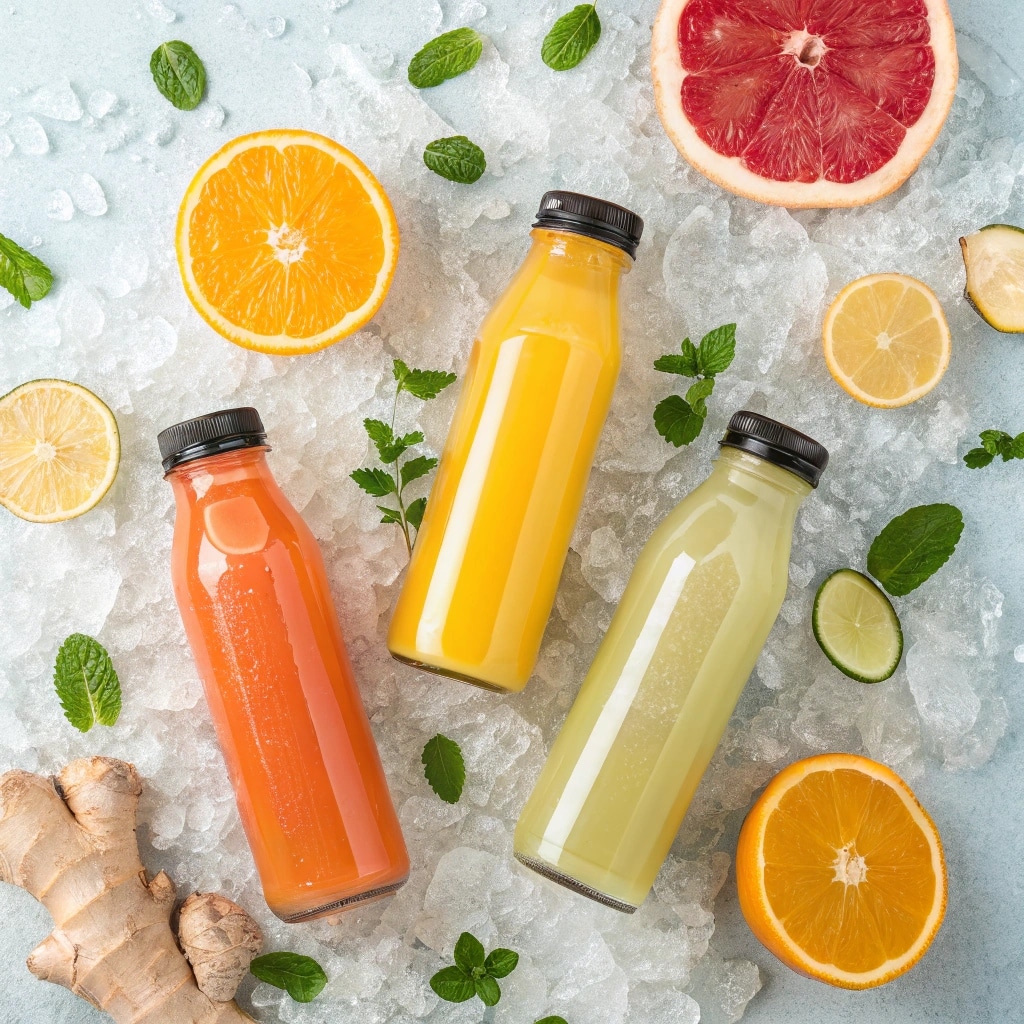Searching for the best citrus juice recipe guide that combines freshness, flavor and health? You’re in the proper location. Citrus juices are perfect if you’re a health conscious eater looking to detox or a juice enthusiast looking for natural energy. Citrus juices, such as lemon, orange, grapefruit and lime, are incredibly versatile full of flavor and packed with vitamin C. When prepared at home they provide potent health benefits.
Discover which citrus fruits are ideal for juicing and how to create your own nutritious concoctions and what research has to say about their nutritional content in this guide. Along with sharing homemade recipes you can use right now we’ll also dissect the most common questions about citrus juices.

Table of Contents
Juice Citrus
Introduction to Juice Citrus
What Are Citrus Fruits and Their Juice Types?
Citrus fruits belong to the Rutaceae family and are known for their tangy flavor and high vitamin C content. When juiced, these fruits produce a naturally sweet-and-sour liquid that’s both refreshing and revitalizing. Common types of citrus juices include:
- Orange juice – the most widely consumed breakfast juice worldwide.
- Lemon juice – highly acidic, perfect for detox drinks or flavor enhancers.
- Lime juice – popular in Latin American cuisine and summer coolers.
- Grapefruit juice – tart and slightly bitter, often used for weight loss or detox.
- Tangerine or mandarin juice – sweeter and lighter, often loved by kids.
These juices can be consumed alone or combined for a more complex flavor. What makes citrus juice recipes so versatile is their ability to blend well with herbs like mint, basil or even ginger.
Why Citrus Juices Are Loved Worldwide
Citrus juices aren’t just about taste. They’re a global staple because they:
- Deliver quick hydration – The water-rich content of citrus fruits is excellent for staying hydrated.
- Boost immunity – Thanks to the high levels of vitamin C, drinking citrus juice helps support immune function.
- Act as natural detoxifiers – Lemon and lime, in particular, aid the liver in flushing out toxins.
- Enhance meals – Citrus juice is a top ingredient in salad dressings, marinades and cocktails.
Nutritional Power of Juice Citrus
Vitamin C and Immune Boosting Properties
When people think of citrus juice, the first thing that usually comes to mind is vitamin C and for good reason. Citrus fruits like oranges, lemons, and grapefruits are among the richest sources of this powerful antioxidant.
Key Benefits of Vitamin C in Citrus Juices:
- Boosts white blood cell production to fight infections
- Speeds up wound healing and tissue repair
- Supports collagen production for skin health
- Fights oxidative stress and aging signs

Here’s how much vitamin C you can get from a single serving (8 oz) of common citrus juices:
| Citrus Juice | Vitamin C per 8 oz | % Daily Value (DV) |
|---|---|---|
| Orange Juice | 124 mg | 137% |
| Grapefruit Juice | 94 mg | 104% |
| Lemon Juice | 45 mg | 50% |
| Lime Juice | 30 mg | 33% |
Even just a small glass of freshly made recipe juice citrus can give your immune system a major daily boost.
Other Key Nutrients Found in Juice Citrus
Citrus juices are more than just vitamin C. They contain a variety of essential micronutrients and antioxidants that support whole-body wellness.
Additional Nutrients Include:
- Folate: Promotes red blood cell production and healthy brain function
- Potassium: Supports heart health and balances fluids
- Magnesium: Aids in muscle relaxation and nerve function
- Thiamine (Vitamin B1): Important for energy metabolism
- Antioxidants: Flavonoids like hesperidin and naringenin reduce inflammation
These nutrients help lower blood pressure, protect your heart and even reduce the risk of chronic diseases when consumed as part of a balanced diet.
And the best part? You get all of this with just one fresh glass of a simple citrus juice recipe.
Top 5 Citrus Fruits Used in Juicing
Orange, Lemon and Grapefruit: The Core Trio
These three citrus giants form the foundation of nearly every refreshing juice recipe. Here’s why:
Orange – The Classic Sweetheart
Oranges are the most popular juicing citrus fruit and for good reason. They’re naturally sweet, full of vitamin C, and easy to juice without added sugar.
- Flavor Profile: Sweet with low acidity
- Juicing Tip: Use navel or Valencia oranges for a sweeter blend
- Best Combo: Pairs beautifully with carrots, ginger or mint
Lemon – The Zesty Powerhouse
Lemons bring sharp acidity and an unmistakable zing to any juice blend. They’re packed with citric acid, which boosts liver detoxification and enhances flavor complexity.
- Flavor Profile: Sharp, tangy and tart
- Juicing Tip: Use in small amounts to balance sweetness
- Best Combo: Combine with honey and cucumber for a refreshing summer drink
Grapefruit – The Fat-Burning Hero
Often featured in detox drinks and fat-burning diets, grapefruit is full of antioxidants like lycopene and vitamin A.
- Flavor Profile: Slightly bitter, tangy-sweet
- Juicing Tip: Use ruby red grapefruit for better taste and color
- Best Combo: Mix with oranges or pineapple to mellow out bitterness
These three fruits alone can create dozens of variations in recipe juice citrus blends, offering flavor, detox, and daily nourishment in one glass.
Lesser-Known Citrus Fruits: Pomelo and Clementine
Pomelo – The Gentle Giant
Pomelo is the largest citrus fruit and often goes underused in juice recipes. It has a mellow sweetness and very little acidity.
- Flavor Profile: Mild, floral and not too tart
- Juicing Tip: Use only the inner flesh avoid the bitter membrane
- Best Combo: Try with lime or mint for a calming citrus blend
Clementine – The Kid-Friendly Citrus
Clementines are a hybrid of mandarins and oranges and are extremely sweet. They have thin skin and no seeds, making them a juicing favorite.
- Flavor Profile: Very sweet, low acid
- Juicing Tip: Combine with lemon or lime to cut sweetness
- Best Combo: Pairs well with strawberries or watermelon
Using these five citrus fruits in different combinations allows you to create endless citrus juice recipes that are tailored to your taste, health goals, and seasons.
Health Benefits of Drinking Juice Citrus
Hydration, Detoxification and Skin Glow
Citrus juices aren’t just tasty they’re packed with functional health benefits that go beyond basic nutrition. Here’s how a glass of citrus juice helps your body thrive:
Hydration Boost
Most citrus fruits are over 85% water. This makes their juice an excellent way to stay hydrated especially when combined with ingredients like cucumber or mint. Proper hydration helps:
- Regulate body temperature
- Transport nutrients
- Support digestion and skin clarity
A cold glass of lemon or orange juice in the morning is one of the simplest ways to start your day energized and hydrated.
Natural Detox Support
Lemon and lime juices are particularly known for stimulating the liver and aiding in natural detox. They help flush out toxins, reduce bloating, and improve digestion.
- Lemon juice activates enzymes in the liver
- The citric acid content helps break down fat
- Vitamin C aids in flushing harmful substances from the bloodstream
If you’re on a cleanse or looking for a light detox, a Juice Citrus recipe with lemon, ginger and cucumber is a great choice.
Skin Rejuvenation
Citrus juice is rich in antioxidants, especially vitamin C and flavonoids which
- Promote collagen production
- Reduce signs of aging like wrinkles and dark spots
- Improve skin elasticity
Regular intake of fresh citrus juice can lead to noticeable improvements in your complexion over time.
Is Juice Citrus Good for Kidneys and Liver?
This is one of the most frequently asked questions and the answer is yes with moderation.
Kidney Support
Citrus juices particularly lemon and lime, are known to help prevent kidney stones. The citric acid binds with calcium in the urine, reducing the risk of crystal formation.
Pro tip: Drink diluted lemon water daily to reduce kidney stone risk without overloading on acidity.

Liver Function
The liver loves vitamin C. Lemon juice especially supports liver function by boosting bile production and helping the body process fats more efficiently.
However people with kidney disease or on medication should consult their doctor before increasing citrus juice intake, due to potential interactions or excessive potassium.
Citric Acid and Its Role in Juice Citrus
Which Juices Are Highest in Citric Acid?
Citric acid is a natural compound found in citrus fruits that gives them their signature tart flavor. It plays a major role in the taste, shelf-life and health effects of citrus juices.
Below is a table showing the citric acid content in some of the most popular citrus juices (per 100ml):
| Juice Citrus | Citric Acid (mg/100ml) |
|---|---|
| Lemon Juice | 4,500 – 5,000 mg |
| Lime Juice | 4,000 – 4,700 mg |
| Grapefruit Juice | 1,000 – 1,500 mg |
| Orange Juice | 400 – 800 mg |
| Clementine Juice | 300 – 500 mg |
As shown above lemon and lime juice recipes contain the most citric acid, making them ideal for recipes aimed at detox, digestion or flavor balancing.
Effects of Citric Acid on Digestion and Health
Citric acid isn’t just a tangy compound it plays a crucial role in several physiological processes and can benefit the body when consumed in moderation.
Digestive Enhancement
Citric acid can stimulate the production of gastric juices, helping break down food more effectively. This can:
- Relieve symptoms of indigestion
- Improve nutrient absorption
- Reduce bloating after meals
Drinking a citrus-based juice 15–20 minutes before a meal may help prime your digestive system.
Kidney Stone Prevention
As mentioned in Part 4, citric acid binds with calcium in the urine, making it less likely to form into stones. This is particularly effective when paired with adequate hydration.
Alkalizing Effect (Despite Acidity)
Despite its sour taste and acidic nature, citric acid has an alkalizing effect in the body after digestion. This can help balance pH levels, reducing systemic inflammation and fatigue.
Cautions to Consider
While beneficial citric acid in high concentrations may cause:
- Tooth enamel erosion – Always rinse your mouth or use a straw
- Stomach discomfort in people with acid reflux or sensitive stomachs
So if you’re crafting a Juice Citrus recipe balance high-acid fruits like lemon or lime with milder ones like orange or tangerine.
Best Homemade Juice Citrus Recipes
Easy 3-Ingredient Citrus Juice Recipe

Sometimes less is more. This simple and refreshing Juice Citrus recipe is ideal for beginners and busy mornings.
Recipe: Morning Glow Juice Citrus
Ingredients:
- 2 large oranges (peeled)
- 1/2 lemon (peeled and seeded)
- 1 small piece of fresh ginger (about 1/2 inch)
Instructions:
- Add all ingredients to a juicer or high-speed blender.
- If using a blender, strain the juice through a fine mesh.
- Serve immediately with ice or chill in the fridge.
Health Perks:
- Boosts immune system
- Aids digestion
- Offers a mild detox
This juice is great before breakfast or post-yoga.
Juice Combinations for Maximum Nutrition
Try these powerful blends that combine flavor, function and freshness perfect for elevating your recipe juice citrus game.
1. Citrus Immunity Bomb
- 2 grapefruits
- 1 orange
- 1/2 lime
- Pinch of cayenne pepper
- Optional: 1 tsp honey
Best for: Cold & flu season
2. Fat Burner Citrus Blend
- 1 lemon
- 1/2 cucumber
- 1 small green apple
- 5 mint leaves
Best for: Detox, digestion, and bloating
3. Citrus Energy Juice
- 1 tangerine
- 1/2 pineapple slice
- 1/2 lemon
- 1/2 inch turmeric root
Best for: Morning wake-up or pre-workout
4. Kid-Friendly Sweet Citrus Mix
- 2 clementines
- 1/2 orange
- 1/4 banana
- 1/2 cup water
Best for: Healthy hydration with low acidity
All of these blends can be juiced fresh and stored in airtight containers in the fridge for up to 48 hours. For best nutrient retention, drink within 24 hours.
When and How to Drink Juice Citrus for Best Results
Best Times of the Day to Drink Juice Citrus
While citrus juice is healthy when you drink it can influence its effects on your body. Here’s how to time your citrus juice intake for different goals:
1. Morning Boost (Empty Stomach)
Drinking a lemon or orange juice blend first thing in the morning helps kickstart your metabolism and rehydrate after sleep.
- Ideal blend: Warm lemon juice + water + a pinch of sea salt
- Benefits: Flushes out toxins, jumpstarts digestion and reboots hydration
2. Pre-Meal Digestive Primer
A citrus-based juice about 20 minutes before eating can help activate digestive enzymes.
- Ideal blend: Grapefruit + ginger + mint
- Benefits: Enhances digestion and reduces post-meal bloating
3. Post-Workout Recovery
Your body loses electrolytes and fluids during a workout. A Juice citrus-rich in potassium and vitamin C is perfect for recovery.
- Ideal blend: Orange + lemon + pinch of pink salt
- Benefits: Replenishes lost minerals, supports muscle recovery and prevents cramps
4. Afternoon Energy Kick
Skip the sugary sodas and go for a citrus-based energy lift instead.
- Ideal blend: Tangerine + lime + pineapple
- Benefits: Natural sugar + hydration without a crash
Note: Avoid drinking Juice Citrus late at night. The acidity may interfere with digestion and sleep, especially if you’re sensitive to heartburn or reflux.
Tips to Maximize Nutrient Absorption
Getting the most from your recipe juice citrus isn’t just about what you put in it it’s about how you consume it.
Use Fresh Organic Ingredients
Organic fruits contain fewer pesticides and often more antioxidants. Always wash them well before juicing.
Don’t Add Sugar
Citrus fruits are already sweet or tangy. Adding sugar ruins the nutritional balance and spikes your blood sugar unnecessarily.
Drink Immediately
Juice Citrus oxidizes fast. Drink it within 15–30 minutes after juicing to get the most nutrients and flavor.
Use a Straw
To protect your tooth enamel from citric acid, drink through a straw and rinse with water afterward.
Combine with Healthy Fats
Add a few chia seeds or drink Juice Citrus alongside a healthy fat source (like avocado toast). This helps with the absorption of fat-soluble nutrients.
Conclusion and Tips to Incorporate Citrus Juice in Daily Diet
Final Thoughts on Citrus Juices
Citrus juices are more than just a refreshing drink they’re a smart, natural source of health benefits. From immune support and hydration to liver detox and skin glow, Juice Citrus recipes offer powerful advantages with every glass.
They’re:
- Easy to make
- Full of flavor
- Incredibly nutrient-dense
- Affordable and accessible year-round
There is a citrus juice recipe for every occasion and need, whether you like orange juice for breakfast or a lemon-ginger detox blend in the afternoon.
Daily Tips to Add Citrus Juices Without Overdoing
Balance is key. Here’s how to enjoy citrus juices regularly without side effects:
Stick to 1–2 servings per day
An 8–10 oz glass of fresh Juice Citrus is plenty for most people. Going overboard can lead to acid overload or blood sugar spikes (especially with added sweeteners).
Rotate citrus fruits
Don’t just stick to oranges. Mix in lemon, lime, grapefruit or tangerine to get different nutrients and flavor profiles.
Pair juice with fiber
Have your Juice Citrus alongside a high-fiber snack (like oats or chia pudding) to slow sugar absorption and improve digestion.
Dilute when needed
If you’re watching acid levels mix your juice with filtered water or herbal tea for a milder version that’s easier on the stomach.
Prep in batches
Use Sunday or mid-week to prepare and bottle small batches of fresh juice. Keep them in airtight glass containers in the fridge and consume within 48 hours.
Juice Citrus FAQs
What juices are citrus?
Juice Citrus come from fruits in the citrus family. The most popular ones include:
Orange juice
Lemon juice
Lime juice
Grapefruit juice
Mandarin or tangerine juice
Clementine juice
Pomelo juice
All these fruits are rich in vitamin C and citric acid and are often used in standalone juices or refreshing juice blends.
Any juice made from these fruits or a combination of them is classified as a Juice Citrus. When combined with other fruits or herbs, they form the base of many immune-boosting, hydrating and detoxifying drinks.
What juices are high in citric acid?
The juices highest in citric acid include:
Lemon juice – up to 5,000 mg/100 ml
Lime juice – close behind lemon
Grapefruit juice – moderate levels
Orange juice – lower but still significant levels
Lemon and lime top the list by far. They’re used in most citrus juice recipes to add zing and detox power. Just be mindful of enamel protection high acidity can wear down teeth if consumed excessively without precautions.
What are the top 5 citrus fruits?
Here are the top 5 citrus fruits for juicing:
Orange – Sweet, hydrating, vitamin C-packed
Lemon – Powerful cleanser and alkalizer
Grapefruit – Fat-burning and full of antioxidants
Lime – Zesty flavor and versatile use
Clementine – Kid-friendly, seedless and sweet
These fruits make up the backbone of any strong recipe juice citrus collection. They’re ideal for solo juices or mix-and-match blends.
Is citrus good for the kidneys?
Yes citrus fruits especially lemon and lime can help support kidney health.
Here’s how:
Citric acid binds calcium in the urine helping prevent kidney stones
Hydration from Juice Citrus keeps your urinary tract flushed and clean
Antioxidants in citrus support cellular protection and reduce inflammation
However people with chronic kidney disease should consult their doctor before consuming potassium-rich juices like orange and grapefruit regularly.

